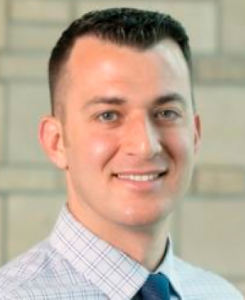The Link Between Emergency Medicine and Primary Care in Rural America
Ameen Taleb, MD, a Diplomate of the American Board of Physician Specialties® (ABPS) and program director of Monroe Clinic Emergency Medicine Fellowship in Monroe, WI, sat down recently with Lori Rodefeld, medical education coach at Monroe, to share their thoughts on the link between emergency medicine and primary medicine in rural America.
 Over the years, emergency departments have seen an increase in visits for primary medical and lower acuity medical concerns. As the healthcare landscape further evolves, the emergency department will play an even larger role in primary care for some patients. Currently, for some people in rural communities, the ER can be the only access to health care.
Over the years, emergency departments have seen an increase in visits for primary medical and lower acuity medical concerns. As the healthcare landscape further evolves, the emergency department will play an even larger role in primary care for some patients. Currently, for some people in rural communities, the ER can be the only access to health care.
According to a 2008 American Academy of Family Physicians (AAFP) report, family physicians outnumber emergency physicians about 7 to 1 in rural areas. One of the major causes of this disparity is that rural communities lack the population density necessary to support a residency-trained emergency physician. The staffing of rural emergency departments can vary based on volume and available providers, and rural EDs typically struggle to recruit physicians who are either EM residency or fellowship trained. At Monroe Clinic, while staffing varies for weekdays, evenings, and weekends, our pool of physicians is sometimes not deep enough for us to have flexibility with coverage and scheduling.
 In light of our nation’s current shortage of EM physicians, it’s crucial for primary care trained physicians to work in rural emergency care. The breadth of training in family medicine makes the family physician a nearly ideal provider of emergency services in rural areas. In fact, family physicians and other primary care doctors provide a wide spectrum of medical care in rural ERs, including the bulk of emergency care. With a solid understanding of clinical follow-ups, they are often the physicians who first see the patient and reevaluate the patient on follow-ups.
In light of our nation’s current shortage of EM physicians, it’s crucial for primary care trained physicians to work in rural emergency care. The breadth of training in family medicine makes the family physician a nearly ideal provider of emergency services in rural areas. In fact, family physicians and other primary care doctors provide a wide spectrum of medical care in rural ERs, including the bulk of emergency care. With a solid understanding of clinical follow-ups, they are often the physicians who first see the patient and reevaluate the patient on follow-ups.
No doubt, working in rural areas can be challenging. Rural hospitals may have limited resources in terms of providers, limited access to specialty care, and must deal with long distances for patient transfers. But rural communities offer a better quality of life, affordable housing, good schools, and lower crime rates. Also, outdoor recreational opportunities like camping, hiking, bicycling, and hunting are readily available in rural areas.
How Physicians Benefit From Working in Rural Areas
Physicians who work in rural America not only benefit from being a part of a smaller community, but, as they become integrated into the area, they also get to know their patients better. The small-town atmosphere offers the chance for a personal connection between physicians and patients. A lower patient population gives physicians more time to familiarize themselves with patients’ medical needs as well as personal needs, thereby fulfilling the traditional role of the primary care physician.
It’s notable that physicians in rural areas often see patient populations that are different from urban areas. For example, the scope of illnesses is broader, which means that health care professionals provide a wider variety of services, some of which in urban areas might be the domain of physician specialists. Working in a rural setting means that a physician must be proactive in performing several aspects of medicine, whether it’s minor surgery or treating minor injuries. For rural physicians, this greater clinical responsibility can lead to professional growth.
Fellowship Training in Emergency Medicine
There can be challenges regarding the credentialing of ER providers for rural communities. Thankfully, many credentialers understand that EM fellowship training through a program approved by the American Academy of Emergency Physicians (AAEP) ensures that a physician is competent and is more likely to be comfortable with higher acuity patients than a physician trained only in a primary care residency program. EM fellowships also provide improved training in a variety of areas, such as trauma, critical care, procedural competency, and ultrasound.
The AAEP Recognizes Distinguished Emergency Medicine Fellowships
Graduates of AAEP-approved fellowships become eligible to apply for board certification through the Board of Certification in Emergency Medicine (BCEM), which is governed by the ABPS.
Earning BCEM certification designates a physician as a qualified emergency medicine specialist, opening the door to greater career opportunities and positioning them as leaders in the healthcare community.
Hospitals and institutions offering these fellowships may seek recognition through the AAEP’s Emergency Medicine Fellowship Recognition Program. This designation is awarded only to programs that demonstrate a high standard of training, equipping physicians with the skills needed to excel in emergency medicine. Recognized fellowships must meet the following criteria:
- Provide supervision by faculty with comprehensive experience in all areas of emergency medicine.
- Foster a structured, academic environment that supports advanced medical education.
- Be based in institutions across the United States.
This recognition underscores a program’s commitment to training the next generation of emergency medicine leaders.
Why Emergency Medicine Fellows Should Pursue BCEM Certification
Obtaining certification from the BCEM is a meaningful milestone that reflects a physician’s advanced knowledge and clinical expertise. BCEM-certified physicians have proven their capabilities through comprehensive exams and performance-based evaluations, making them highly regarded by healthcare leaders and institutions.
Employing a BCEM-certified physician sends a clear message about a facility’s commitment to quality care, enhancing its reputation and building trust within the community. For fellowship graduates, BCEM certification demonstrates a commitment to excellence that extends beyond their training—positioning them as exceptional candidates for emergency department roles across the country.
If you would like to learn more about the relationship between primary and emergency care in rural communities, or if you want information about EM fellowship programs developed under the rigorous standards of the American Academy of Emergency Physicians, an affiliate of the AAPS, contact the ABPS today.










